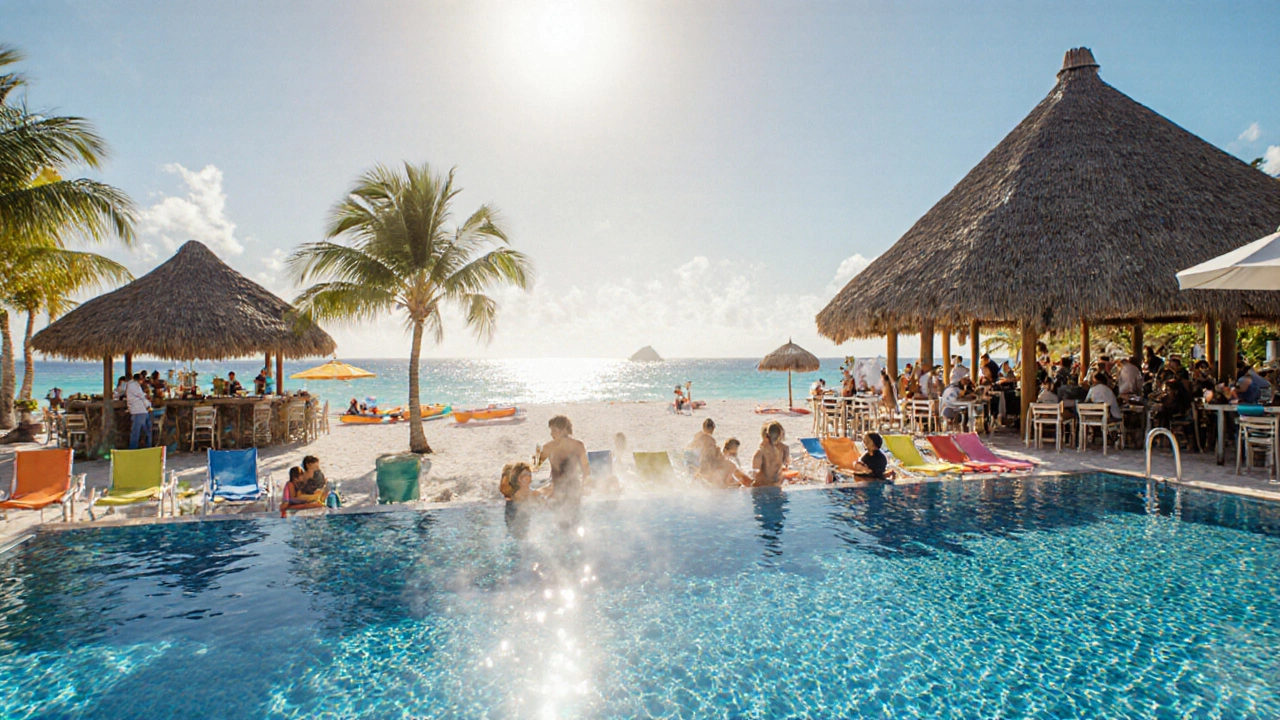All-Inclusive Resort Cost Calculator
Scenario Setup
Enter your trip details below to compare the cost of an all-inclusive resort versus a traditional pay-as-you-go option.
Cost Comparison Results
All-Inclusive Option
Total Cost:
Cost per Person:
Traditional Pay-As-You-Go Option
Total Cost:
Cost per Person:
When you see a glossy ad promising unlimited meals, drinks, and activities for a single price, the first question that pops up is: all-inclusive resort - is it really a smart way to spend your holiday budget? This article breaks down the true value of all‑inclusive stays, highlights when they shine, and shows how to avoid hidden pitfalls so you can decide if they fit your travel style.
What Exactly Is an All‑Inclusive Resort?
All‑inclusive resort is a type of accommodation that bundles lodging, meals, drinks (including alcoholic beverages), and most on‑site activities into one upfront price. Unlike a traditional resort where you pay for each meal or excursion separately, the all‑inclusive model aims to simplify budgeting and encourage guests to use the property’s amenities freely.
Key Benefits That Make All‑Inclusive Appealing
- Predictable Cost: You know the total expense before you book, which eliminates surprise charges.
- Convenient Dining: Unlimited access to multiple restaurants, buffets, and snack bars means you never have to hunt for the next meal.
- Unlimited Drinks: From soft drinks to premium cocktails, the bar is usually open from sunrise to midnight.
- Activity Access: Most resorts include water sports, fitness classes, kids’ clubs, and nightly entertainment in the base price.
- Family‑Friendly Packages: Kids often eat and drink for free, and many resorts provide supervised clubs, making it easier for parents to unwind.
Common Drawbacks You Need to Watch
- Hidden fees such as premium‑brand alcoholic drinks, spa treatments, and off‑property excursions can add up quickly.
- Food quality may vary; buffet‑style meals can feel repetitive, and à la carte options are sometimes limited.
- Resort crowds: Unlimited access means popular pools and restaurants can become overcrowded during peak hours.
- Limited local experience: Staying on‑site all day can reduce opportunities to explore nearby towns or authentic eateries.
- Rigid cancellation policies: Pre‑paying the full amount often ties you to strict refund rules.

When an All‑Inclusive Resort Is a Smart Choice
Not every traveler benefits equally. Here are the scenarios where the model shines:
- Family vacation with children - kids eat and drink for free, and kids’ clubs keep them entertained while parents relax.
- Couple getaway looking for a stress‑free romantic setting - unlimited meals and drinks let you focus on each other.
- Travelers on a tight budget who want to avoid day‑to‑day spending decisions.
- People who love on‑site activities like water sports, yoga classes, and nightly shows - you’ll get the most value when you actually use these amenities.
When to Skip the All‑Inclusive Model
If you thrive on culinary exploration, want to immerse yourself in local culture, or plan to spend most of your time off‑property, a conventional resort or boutique hotel may suit you better. In those cases, you’ll likely spend more on meals and transport, but you’ll gain richer experiences.
How to Maximize Value: Practical Tips
- Research the food & beverage offerings. Look for a variety of cuisines and quality ratings from past guests.
- Check the activity list before booking. Ensure the resort provides the specific experiences you want (e.g., scuba diving, tennis, cooking classes).
- Watch out for premium‑brand alcohol. If you prefer top‑shelf drinks, calculate the additional cost per glass and compare it with a regular bar outside.
- Take advantage of early‑bird or loyalty discounts. Many chains offer reduced rates for repeat guests or members of their reward programs.
- Plan a “stay‑in” day. Use the all‑inclusive benefits for a full day of meals and activities, then venture out for a local excursion on a lighter budget day.
- Read the fine print on gratuities. Some resorts include service charges; others leave tipping to the guest, which can affect the final cost.
Cost‑Benefit Comparison: All‑Inclusive vs. Pay‑As‑You‑Go
| Factor | All‑Inclusive Resort | Traditional (Pay‑As‑You‑Go) Resort |
|---|---|---|
| Up‑front cost | Single bundled price (e.g., $250/night) | Room only (e.g., $150/night) + separate meals/activities |
| Meal variety | Multiple restaurants, buffets, and snack bars | Often limited on‑site options; external dining needed |
| Drink flexibility | Unlimited soft drinks & standard alcohol; premium drinks extra | Pay per drink; can choose premium brands without surcharge |
| Activity access | Included water sports, fitness classes, kids' clubs | Usually extra fees per activity |
| Hidden costs | Potential premium alcohol, spa, off‑site tours | Variable - can be lower or higher depending on choices |
| Budget predictability | High - most expenses covered up front | Low - daily spending fluctuates |

Real‑World Example: A 7‑Night Stay in Cancun
Emma and her family booked a 7‑night stay at a popular all‑inclusive resort for $2,200 total ($315 per night). The package covered:
- All meals and drinks (including kids’ meals)
- Unlimited access to the pool, beach volleyball, and nightly shows
- Kids’ club for children aged 4‑12
During the stay they splurged on two premium cocktail evenings ($15 each) and a spa massage ($80). Their extra spend was $110, bringing the final cost to $2,310. If they had booked a standard hotel at $150 per night, they would have paid $1,050 for the room and roughly $1,400 for meals, drinks, and activities, totaling $2,450 - slightly higher while requiring daily budgeting.
This example illustrates how the all‑inclusive model can simplify finances and still be competitive, especially for families who make heavy use of on‑site amenities.
Bottom Line: Is It Worth It?
If you value budget certainty, want unlimited access to food, drinks, and resort activities, and plan to spend most of your vacation on the property, an all‑inclusive resort often delivers strong value. For travelers eager to explore local cuisine, culture, or off‑site adventures, the same budget could stretch further with a traditional resort.
Ask yourself these three quick questions before you click “book now”:
- Will I use the on‑site dining and activity options enough to offset extra fees?
- Do I prefer a “set‑and‑forget” budget over daily spending decisions?
- Is the resort located in a destination where leaving the property is essential for the experience?
Answering “yes” to the first two and “no” to the third indicates an all‑inclusive stay is likely worth it for you.
Next Steps: Planning Your All‑Inclusive Getaway
- Identify your travel dates and check the peak‑season price spikes.
- Read recent guest reviews focusing on food quality and activity satisfaction.
- Compare at least three resorts using the table above as a checklist.
- Book directly with the resort or a reputable travel agent that offers flexible cancellation.
- Pack light - most all‑inclusive locations provide towels, beach gear, and Wi‑Fi.
Frequently Asked Questions
Do all‑inclusive resorts include airport transfers?
Many brands bundle airport shuttles in the price, but it’s not universal. Always check the resort’s amenities list before booking.
Can I bring my own wine or alcohol?
Policies vary. Some resorts allow a limited number of bottles for a corkage fee, while others prohibit outside alcohol entirely.
Are children truly free at all‑inclusive resorts?
Kids under a certain age (often 12) eat and drink at no extra charge, but some premium drinks and special activities may still cost extra.
How do I avoid paying for premium alcoholic brands?
Stick to the standard cocktail menu, order local beers, or ask staff for the “house” label, which is usually included.
Is it worth purchasing travel insurance for an all‑inclusive booking?
Yes, especially if the resort has a strict non‑refundable policy. Insurance can protect you against illness, flight cancellations, or unexpected travel bans.
What’s the best time of year to find a deal on an all‑inclusive resort?
Shoulder seasons (late spring or early autumn) often combine pleasant weather with lower rates and fewer crowds.

